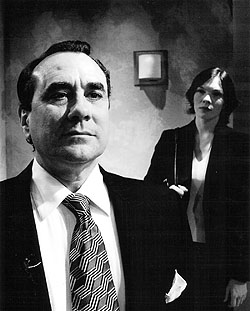DEALING WITH CLAIR (2004)
Return to the list of Past
Productions
DEALING WITH CLAIR
by MARTIN CRIMP
directed by ANDREW J. ROBINSON
Producer - JOSEPH STERN
starring Abigail Brammell, Lesley Fera, Gregg Henry,
Morlan Higgins, Brendan Hines, Gregory Itzin,
Jay Karnes, Julie Mann, Abigail Revasch,
Rachel Robinson and Christian Svensson
Dealing With Clair made an early splash for writer
Martin Crimp, now generally acknowledged as a successor to the Pinter with
echoes of Mamet (Quite a pedigree!). He uses mordant humor to expose the
foibles of the contemporary middle class. A satirical examination of the
property boom in Britain, Clair combines burgeoning greed with the
real-life disappearance of a young real estate agent, thus creating an
enigmatic atmosphere at once familiar and thankfully, distant.
Fellow playwright Joe Penhall says, "Crimp is virtually
alone among contemporary playwrights in his ability to write utterly real,
hilariously unlikable characters -- who remind us of our neighbors, our
friends, our colleagues, ourselves."

Click on the picture to see a larger version

REVIEWS
L.A. Times - October 22, 2004
Relationships as dicey real estate
by Rob Kendt
(Photo, L-R: Morlan Higgins, Lesley Fera & Gregg Henry)
 "Atmosphere" is one selling point of the cozy London home at the center of
politely tense negotiations in Martin Crimp's "Dealing With Clair." "Atmosphere" is one selling point of the cozy London home at the center of
politely tense negotiations in Martin Crimp's "Dealing With Clair."
Atmosphere is also a key element in the play's nuanced suspense -- the
unspoken desires and resentments in the air as a cool young real estate
agent, Clair (Abigail Brammell), handles the sale between a bickering
couple (Jay Karnes and Rachel Robinson on the night reviewed) and a
weirdly charming businessman, James (Morlan Higgins on the night reviewed;
the show is double-cast except for Brammell).
Clair is compelled to represent each party to the other in ways that are
unavoidably intimate, emotionally taxing and borderline creepy. The key
word is "borderline": Storm clouds that gather around Crimp's characters
never quite burst.
The Matrix Theatre's U.S. premiere production artfully skims along the
play's implacable surface while subtexts roil below.
Director Andrew J. Robinson, who's mounted expert Matrix productions of
Pinter and Beckett, mines every exchange for maximum transactional value:
the way the husband unconsciously condescends to, and comes on to, his
child's Italian nanny (Abigail Revasch), or the way James draws out the
reserved Clair, for personal reasons that are never clear.
If there's a drawback in Robinson's approach, it's that some subtleties
are italicized too broadly, particularly between the self-involved
marrieds. Their escalating contention, which is more demonstrative than
seems entirely English, tends to overwhelm the play's central enigma: the
deceptively brisk, businesslike Clair.
The muted tones of Stephanie Kerley Schwartz's set and Dan Weingarten's
lights situate the property on the edge between comfortable seclusion and
spooky isolation.
If we're more unsettled than satisfied by the play's icy denouement, that
is surely as Crimp intended. We can be haunted more, in the end, by what's
unsaid and unseen..
L.A. Weekly - PICK OF THE WEEK
by Steven Leigh Morris
(Photo, L-R: Morlan Higgins & Abigail Brammell)
 The Matrix
Theater Company is back after a three-year hiatus with another in a series
of topflight repertories, all double cast, because of the likelihood that
these actors will be called in for industry work at a moment's notice.
Producer Joe Stern created this system — call it defensive or pre-emptive,
or whatever. This production lays to rest the critique that actors are
throwing together productions in their "downtime." Andrew J. Robinson's
spare staging of Martin Crimp's play reveals considerably more craft and
polish than, say. Cheek by Jowl's production of Othello, a London
import staged at UCLA last week — and a company that has the luxury of
doing theater in its "uptime." In this American premiere, the Matrix
introduces L.A. to Crimp, a Pinteresque English playwright who even shares
Pinter's literary agent. Crimp's real estate satire shows almost every
character, at some point, insisting on doing the "honorable" thing — none
does. In the course of the action, a broker named Clair (Abigail Brammell),
whom we see living on the railway tracks, disappears without a trace. The
play studies the high-toned hypocrisy of all the players that leads to her
presumably gruesome demise. On the night I attended, Gregory Itsin played
the latter-day Jack the Ripper with wily eccentricity — grease-covered
twitches beneath a donlike facade — in a nuance-laced performance like few
I've seen this year. Brammell was a marvelously fluttery waif, trying to
muster some weight in her negotiations. With shudder-inducing
authenticity, Gregg Henry and Lesley Fera played an ethically bankrupt
couple trying to sell their London home. In a comedic cameo, Julie Mann
portrayed their Italian nanny, barely speaking English, smiling
seductively and lying about in strategically arousing positions. The Matrix
Theater Company is back after a three-year hiatus with another in a series
of topflight repertories, all double cast, because of the likelihood that
these actors will be called in for industry work at a moment's notice.
Producer Joe Stern created this system — call it defensive or pre-emptive,
or whatever. This production lays to rest the critique that actors are
throwing together productions in their "downtime." Andrew J. Robinson's
spare staging of Martin Crimp's play reveals considerably more craft and
polish than, say. Cheek by Jowl's production of Othello, a London
import staged at UCLA last week — and a company that has the luxury of
doing theater in its "uptime." In this American premiere, the Matrix
introduces L.A. to Crimp, a Pinteresque English playwright who even shares
Pinter's literary agent. Crimp's real estate satire shows almost every
character, at some point, insisting on doing the "honorable" thing — none
does. In the course of the action, a broker named Clair (Abigail Brammell),
whom we see living on the railway tracks, disappears without a trace. The
play studies the high-toned hypocrisy of all the players that leads to her
presumably gruesome demise. On the night I attended, Gregory Itsin played
the latter-day Jack the Ripper with wily eccentricity — grease-covered
twitches beneath a donlike facade — in a nuance-laced performance like few
I've seen this year. Brammell was a marvelously fluttery waif, trying to
muster some weight in her negotiations. With shudder-inducing
authenticity, Gregg Henry and Lesley Fera played an ethically bankrupt
couple trying to sell their London home. In a comedic cameo, Julie Mann
portrayed their Italian nanny, barely speaking English, smiling
seductively and lying about in strategically arousing positions.
BackStage West - October 28, 2004
by Dany Margolies
How do we "deal?" We ignore, we try harder, we overcompensate, we
sublimate. How do we begin to understand a play? We hear words, we see
gazes, we somehow feel disquieted. In English playwright Martin Crimp's
U.S. premiere, the financial dealings that concern a London house being
brokered by London real estate agent Clair are told in fairly
straightforward language. Other dealings are told through bits of
conversations, subtle metaphors, nervous laughter. To these director
Andrew J. Robinson and his flawless cast add inflection, a tensed fist, a
tetchy tone, a longing glance. The result is a production that shames us,
shakes us, and best of all makes us think about our priorities,
moralities, responsibilities, and pathologies.
Clair is a realtor accustomed to dealing with aggression - not violence,
she tells her mother. Maybe she'll make a killing and just vanish, she
says at the top of the play. We witness passive aggression; any violence
is for our quivering imaginations. Abigail Brammell plays Clair as a
confident but slightly reserved twentysomething - certainly likeable, even
though we, as others, get to know Clair only slightly. Otherwise the
production is double-cast, providing an exquisite study of acting choices.
Played by Jay Karnes and Rachel Robinson, the sellers are freshly young
and cheery, able to rib each other, with Karnes as a particularly sunny
and seemingly irreproachable young husband. Played by Gregg Henry and
Lesley Fera, the couple seems less newlywed, slightly darker - Fera's wife
is more distracted, Henry is more of a dab hand at glad-handing. As for
their Italian nanny - a fascinating addition to the storyline - Julie Mann
plays her as sweeter, more childlike, merely lacking in know-how or
energy, while Abigail Revasch plays her from simpering to devious,
desultorily failing to step in where needed. Brendan Hines and Christian
Svensson alternate in three charming one-scene roles.
But the show belongs to the actor playing James - the buyer, the probable
perpetrator, the quintessential satanic figure masquerading in upper-class
tones. Morlan Higgins plays him with exquisite longing, with a slowly
revealed deviancy. Greg Itzin's James is slightly dandified, more
restless, less willing to wait for his prey. Whatever is done to Clair -
and Crimp's language and the actors' physicalities offer ample clues but
never quite tell us - Higgins' actions more likely came from worshiping
Clair too much, Itzin's from hating her, perhaps hating all women. Near
the play's end, in Clair's apartment, Higgins luxuriates in her sheets,
while Itzin seems there to tidy up any mess.
But nothing could sicken us as much as the nonchalance of the sellers and
the new agent. They momentarily toy with guilt, thinking of the "right"
thing to do, and then dust it all away, turning their gazes inward to
themselves and their pockets. Now who's the villain?
Return to the list of Past
Productions |